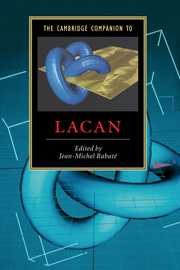Book contents
- Frontmatter
- 1 Lacan’s turn to Freud
- 2 The mirror stage: an obliterated archive
- 3 Lacan’s myths
- 4 Lacan’s science of the subject: between linguistics and topology
- 5 From the letter to the matheme: Lacan’s scientific methods
- 6 The paradoxes of the symptom in psychoanalysis
- 7 Desire and jouissance in the teachings of Lacan
- 8 Lacan and philosophy
- 9 Lacan’s Marxism, Marxism’s Lacan (from Žižek to Althusser)
- 10 Ethics and tragedy in Lacan
- 11 A Lacanian approach to the logic of perversion
- 12 What is a Lacanian clinic?
- 13 Beyond the phallus: Lacan and feminism
- 14 Lacan and queer theory
- 15 Lacan’s afterlife: Jacques Lacan meets Andy Warhol
- Further reading
- Index
- Series List
7 - Desire and jouissance in the teachings of Lacan
Published online by Cambridge University Press: 28 May 2006
- Frontmatter
- 1 Lacan’s turn to Freud
- 2 The mirror stage: an obliterated archive
- 3 Lacan’s myths
- 4 Lacan’s science of the subject: between linguistics and topology
- 5 From the letter to the matheme: Lacan’s scientific methods
- 6 The paradoxes of the symptom in psychoanalysis
- 7 Desire and jouissance in the teachings of Lacan
- 8 Lacan and philosophy
- 9 Lacan’s Marxism, Marxism’s Lacan (from Žižek to Althusser)
- 10 Ethics and tragedy in Lacan
- 11 A Lacanian approach to the logic of perversion
- 12 What is a Lacanian clinic?
- 13 Beyond the phallus: Lacan and feminism
- 14 Lacan and queer theory
- 15 Lacan’s afterlife: Jacques Lacan meets Andy Warhol
- Further reading
- Index
- Series List
Summary
Jouissance, the opposite pole of desire
On 5 March 1958, the theory, the technique, and the history of psychoanalysis were substantially changed. This change came about almost unnoticed by anyone, perhaps even unnoticed by Lacan himself, who could not have predicted where the path he had undertaken would lead. On that day, the teacher told his students that he wanted to show them what was meant by “. . . a notion . . . that has always been implied in our reflections on desire but that deserves to be distinguished from it, and which can only be articulated after one is sufficiently imbued in the complexity that constitutes desire. It is a notion that will be the other pole of today's discourse and it has a name: it is jouissance.” He ended this lecture by referring to “the essential question of desire and jouissance of which I gave you, today, a first gram.” When editing that fourteenth session of the seminar, The Formations of the Unconscious, Jacques-Alain Miller justifiably gave it the title Desire and Jouissance.
The following twenty years of Lacan’s teaching (who would have guessed the kilo that followed that first gram?) revolved around this opposition. Until then, the word jouissance had appeared in the Lacanian vocabulary simply as a word whose meaning – the conventional one – required no further explanation. Yet from that day on it became a term rich in nuances, a term that would get progressively more complicated, multiplying and defining itself until it was transformed into the foundation of a new psychoanalysis: a “notion” without which all else becomes inconsistent.
- Type
- Chapter
- Information
- The Cambridge Companion to Lacan , pp. 102 - 115Publisher: Cambridge University PressPrint publication year: 2003
- 47
- Cited by



